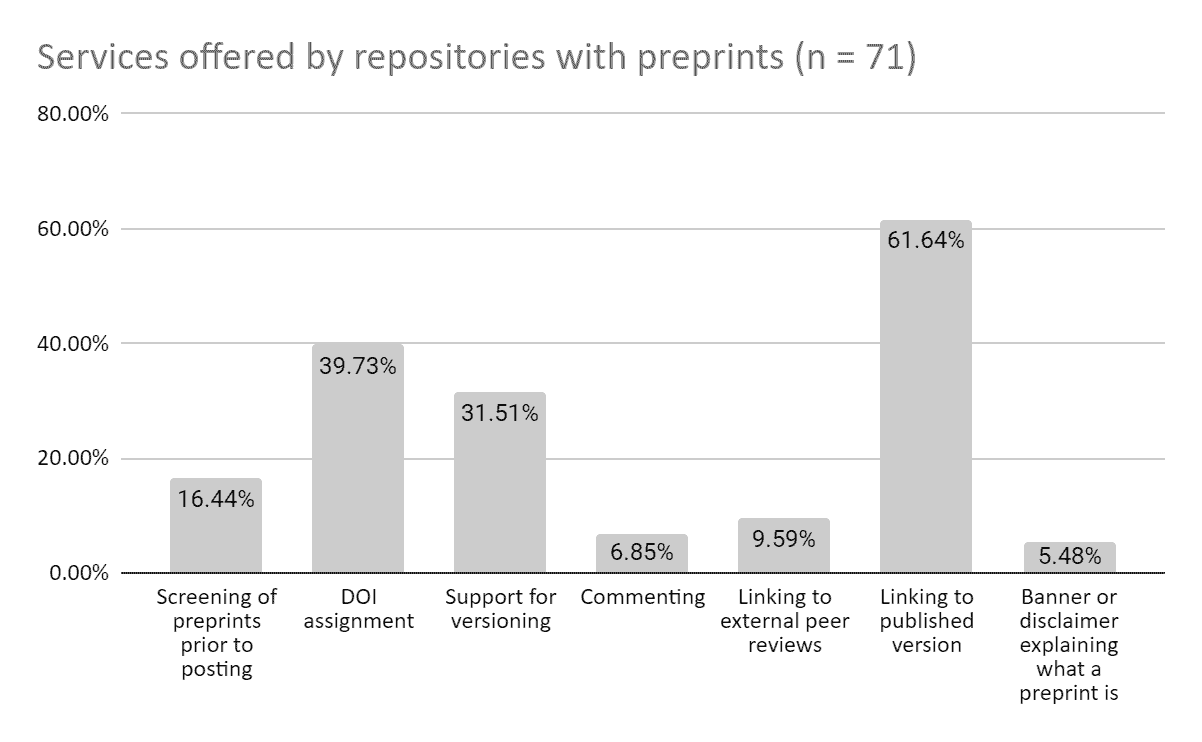As open scholarship practices grow, dedicated preprint servers are springing up in many disciplines. However, researchers are also depositing preprints in other platforms, including institutional and generalist repositories. These destinations can be familiar to researchers and well-integrated into the scholarly communications infrastructure, but many do not presently offer the same preprint-related features found in purpose-built servers.
In late summer 2021, COAR and ASAPbio ran a survey of institutional and generalists repositories (IRs) to understand their practices and plans regarding the collection of preprints. Our preliminary results revealed that approximately two thirds of the responding repositories currently host preprints. After delving deeper into the data, we’re excited to share some more detailed findings.
Preprint collections in repositories across the globe
Respondents
116 institutional and generalist repositories from 35 countries responded to the survey, including particularly strong representation from Brazil, the United Kingdom (UK), and the United States (US). With over 3,000 institutional and generalist repositories around the world, the respondents represent a very small sample size and therefore the results should not be generalized. Out of the 116 responses we analyzed (after excluding from our original sample two responses from a data repository and a search tool), 61% (71) of respondents reported currently hosting preprints.
| Country in which the repository is based | n = 116 |
| Argentina | 3.45% |
| Australia | 4.31% |
| Austria | 0.86% |
| Belgium | 0.86% |
| Brazil | 12.93% |
| Canada | 2.59% |
| China | 0.86% |
| Colombia | 0.86% |
| Croatia | 0.86% |
| England | 0.86% |
| Ethiopia | 0.86% |
| Finland | 0.86% |
| France | 1.72% |
| Germany | 4.31% |
| Ghana | 2.59% |
| Hungary | 1.72% |
| Ireland | 0.86% |
| Japan | 0.86% |
| Kazakhstan | 1.72% |
| Kenya | 0.86% |
| Lesotho | 0.86% |
| Malaysia | 0.86% |
| Mozambique | 0.86% |
| Myanmar | 0.86% |
| Nigeria | 0.86% |
| Norway | 0.86% |
| Portugal | 6.03% |
| Singapore | 3.45% |
| Somalia | 0.86% |
| South Africa | 1.72% |
| Spain | 8.62% |
| Sweden | 0.86% |
| Switzerland | 1.72% |
| UK | 15.52% |
| US | 11.21% |
Quantity of preprints
Several repositories (12) indicated that they don’t know how many preprints they have in their collections. This is likely because they do not distinguish between preprints and other article versions in their metadata records.
For those repositories who do tag preprints uniquely (53), the mean number of preprints in their collections was 704. Notably, this number is significantly larger than the collections of some existing dedicated preprint servers.
Unique copies
Most respondents hosting preprints (68%) were also unsure whether or what portion of the preprints in their collections were also hosted on a preprint server.
Features and functionalities
Respondents were asked whether their repositories support some of the common functionalities provided by dedicated preprint services. Among the 71 repositories that host preprints, the majority (62%) link to the published version. DOI assignment (40%) and support for versioning (32%) are also common features. On the other hand, screening (16%), linking to external peer reviews (10%), commenting tools (7%), and banners or disclaimers explaining what a preprint is (5%) were less often supported.
What’s next
The preprint community has been developing good practices that respond to the unique challenges associated with managing preprints, such as identifying preprint versions, linking to journal versions (Beck et al 2020), and transparently labeling these objects to clarify their peer review status to a broad range of readers. In the biomedical domain, Europe PMC and NCBI preprint indexing criteria define important features that impact the visibility of preprints in these databases, and as such can influence the decisions of preprint servers in these disciplines. It is not yet clear how the unique requirements for managing preprints can be best supported in repositories with a broader remit and with access to diverse resource types. Yet, as preprint sharing becomes more widespread, it is clear that these generalist repositories have a role to play in supporting open and early sharing of research manuscripts, particularly in cases where researchers would prefer to post their preprint in a local or national infrastructure or in which institutions seek to archive a more complete collection of scholarly outputs.
To help the community better support preprint sharing, COAR and ASAPbio will be jointly convening a working group to better understand the challenges for repositories, develop good practice recommendations, and define a strategy for advancing the collection of preprints in institutional and generalist repositories.
For more information, please contact Kathleen Shearer, Executive Director, COAR (kathleen.shearer@coar-repositories.org) or Jessica Polka, Executive Director, ASAPbio (jessica.polka@asapbio.org)







